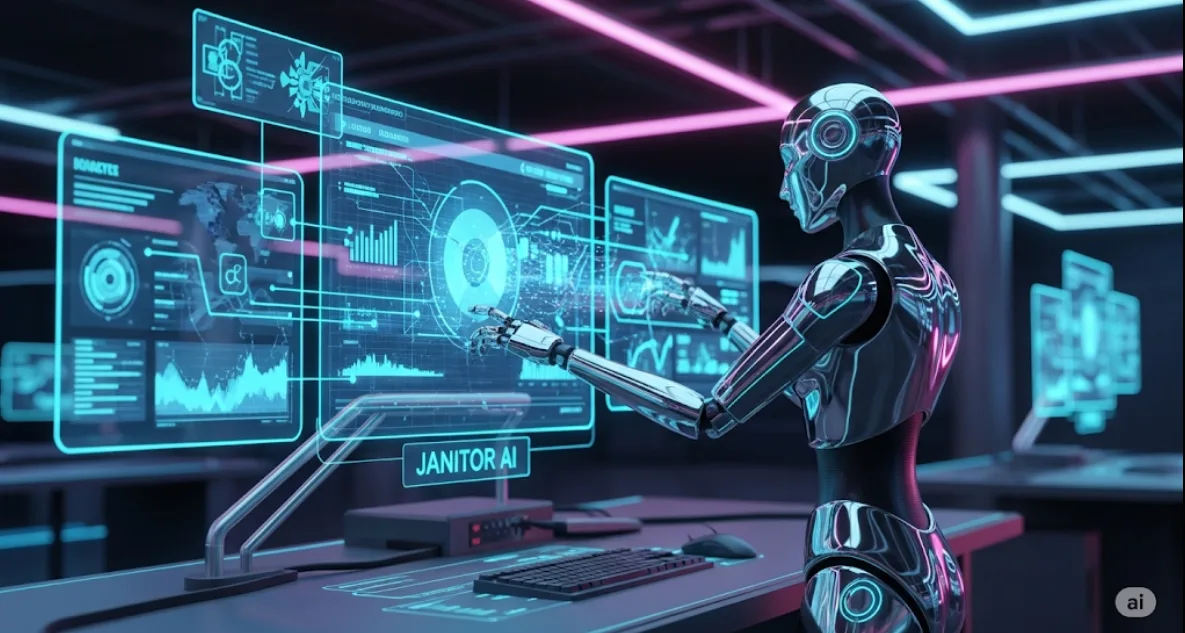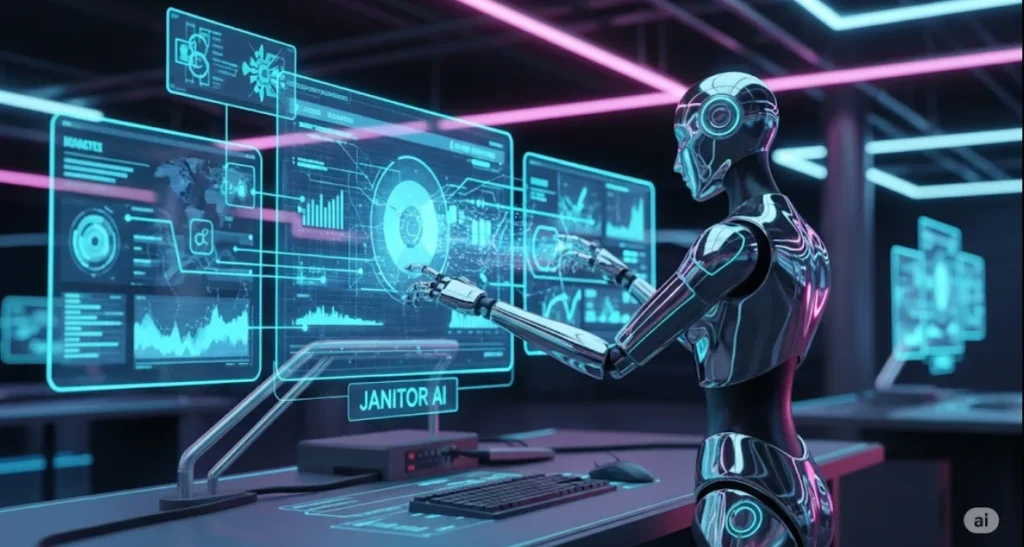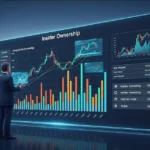In the ever-evolving landscape of business technology, 2025 is shaping up to be the year artificial intelligence goes from “nice-to-have” to mission-critical. One of the most intriguing and disruptive innovations is Janitor AI—an AI-powered system designed to automate digital maintenance, clean data pipelines, and handle routine backend tasks so your team can focus on growth and innovation.
This guide explores unlocking the power of Janitor AI for your business in 2025, showing how it can streamline operations, reduce costs, and unlock new levels of productivity.

🤖 What Is Janitor AI?
Janitor AI refers to intelligent automation systems—often chat-based or autonomous bots—used to “clean” business environments. This includes:
Cleaning up dirty or unstructured data
Managing backend operations
Automating repetitive admin or IT tasks
Identifying and fixing workflow inefficiencies
Organizing digital files and content repositories
Think of it as a digital janitor—but one powered by cutting-edge AI models that understand your business’s digital infrastructure and can operate across various software environments.
🧠 Why Janitor AI Matters in 2025
With data volumes exploding and systems becoming increasingly interconnected, most businesses face:
Disorganized data silos
Outdated workflows
Cluttered software environments
Employee burnout from repetitive tasks
Unlocking the power of Janitor AI for your business in 2025 addresses all these pain points by handling the digital grunt work that slows companies down.
🏢 Use Cases: How Businesses Are Using Janitor AI in 2025
1. Data Cleanup and Normalization
Janitor AI parses through messy databases, eliminates duplicates, standardizes formats, and ensures consistency across CRM, ERP, and marketing tools.
Example: A retail chain uses Janitor AI to clean its customer database, fixing inconsistent names, outdated addresses, and mismatched phone formats.
2. Automated File Organization
Janitor AI scans shared drives or cloud storage (e.g., Google Drive, SharePoint) and categorizes files based on content, dates, or relevance.
Example: A law firm deploys Janitor AI to organize thousands of scanned PDFs into labeled folders by client and case type.
3. Software Hygiene Monitoring
Janitor AI checks for outdated plugins, broken integrations, and unnecessary bloat in enterprise software stacks—then either cleans or flags them.
Example: An e-commerce business uses Janitor AI to regularly scan Shopify, Zapier, and Slack workflows for inefficiencies.
4. Chatbots That Self-Maintain
Janitor AI powers conversational agents that not only respond to queries but also update themselves, cleaning conversation logs, retraining on FAQs, and flagging out-of-scope requests.
Example: A SaaS company uses Janitor AI to keep its customer support bot optimized without developer intervention.
5. AI-Powered Compliance & Audit Readiness
Automatically cleans audit trails, ensures naming conventions are followed, and flags outdated compliance records.
Example: A financial services firm uses Janitor AI to maintain GDPR and SOC 2 compliance across its platforms.
🔍 Benefits of Unlocking the Power of Janitor AI for Your Business in 2025
| Benefit | Impact |
|---|---|
| Increased Productivity | Employees spend less time on tedious tasks |
| Cost Reduction | Eliminates need for manual data cleaning or IT auditing |
| Improved Data Accuracy | Enables better decision-making with cleaner data |
| Stronger Security | Identifies and closes digital vulnerabilities |
| Operational Scalability | Automates foundational processes to support growth |
Unlocking the power of Janitor AI for your business in 2025 allows for leaner operations and a more agile digital infrastructure.
🛠️ Popular Janitor AI Tools & Platforms in 2025
| Tool | Purpose |
|---|---|
| OpenJanitor AI | Open-source AI designed for enterprise data hygiene |
| Zapier AI Cleaner | AI layer that auto-cleans workflows and integrations |
| SanityBot | Maintains CMS and content repositories by deleting outdated assets |
| Notion AI Janitor Plugin | Organizes pages, detects duplications, suggests structure |
| Salesforce Einstein Cleanup | Built-in assistant that suggests CRM hygiene fixes |
Most of these integrate directly with your existing software stack, making adoption frictionless.
🔧 How to Implement Janitor AI in Your Business
✅ Step 1: Audit Current Digital Clutter
Review how much time teams spend organizing files, cleaning data, or resolving low-level system issues.
✅ Step 2: Choose a Janitor AI Platform
Select one based on your business needs—data-focused, file organization, chatbot maintenance, or app hygiene.
✅ Step 3: Pilot in a Single Department
Start with marketing, customer service, or finance—any area with recurring maintenance tasks.
✅ Step 4: Monitor and Customize
Use feedback loops and logs to fine-tune how Janitor AI operates. Most models improve via reinforcement learning or custom prompt tuning.
✅ Step 5: Scale Across Teams
Once optimized, roll out Janitor AI across HR, IT, Sales, and beyond. The compound efficiency gains are massive.
📈 Real-World Example: Janitor AI in Action
Company: Mid-size HR Software Firm
Challenge: Disorganized HR documentation, duplicate entries, compliance risk
Solution: Implemented Janitor AI inside Notion and their HRIS
Results:
78% reduction in file clutter
3.5 hours/week saved per HR team member
Zero compliance audit flags in the last 12 months
This demonstrates how unlocking the power of Janitor AI for your business in 2025 leads to real, quantifiable results.
⚠️ Risks & Limitations to Consider
While Janitor AI can be transformative, be mindful of:
| Risk | Mitigation |
|---|---|
| Over-cleaning | Set clear boundaries; review AI logs regularly |
| Loss of critical data | Always back up before enabling automation |
| Integration limits | Choose tools compatible with your tech stack |
| Bias in AI cleaning rules | Fine-tune based on use cases and team input |
Proper implementation ensures you get the efficiency without unintended side effects.
🔮 The Future of Janitor AI in 2025 and Beyond
Janitor AI is evolving rapidly. Expect to see:
Self-healing workflows: Bots that fix themselves
AI DevOps assistants: Clean up codebases, repositories, and outdated scripts
AI-driven project hygiene: Managing tasks, naming conventions, and ticketing
Predictive AI maintenance: Suggest improvements before errors occur
Unlocking the power of Janitor AI for your business in 2025 is just the beginning of a new wave of ambient AI automation.
🔗 Related Reads You Might Like:



Pingback: 5 Best AI screeners for stocks in 2025 - Trade Pluse Ai